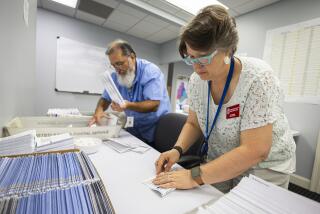U.S. Judge Allows Arizona to Accept Internet Votes
- Share via
PHOENIX — Opening a potentially controversial era in American politics, a federal judge Tuesday gave the Arizona Democratic Party the green light to hold the nation’s first binding election that will accept ballots from the Internet.
After nearly 10 hours of testimony, U.S. District Judge Paul G. Rosenblatt ruled that the Voting Integrity Project of Arlington, Va., failed to demonstrate that online voting would have a discriminatory effect on minority voters, who experts say are generally less affluent than whites in the state and are therefore less likely to have access to the Internet.
The Virginia group put one Latino and two black registered Arizona voters on the stand who claimed they would be disadvantaged by an online vote because they lack convenient Internet access. But Arizona Democratic Party Chairman Mark Fleisher, who also testified, said the party’s aim was to expand voting opportunities in a state where just 12,800 of more than 800,000 registered Democrats cast votes in the largely uncontested 1996 Democratic Party presidential preference vote.
“I am not persuaded that there is a ‘digital divide’ that will result in racial discrimination,” Rosenblatt said before denying the project’s request for a preliminary injunction to block the Arizona Democratic Party from accepting ballots cast over the Internet.
Lawyers for the Voting Integrity Project made an unsuccessful bid to persuade Rosenblatt to stay his order and indicated that they may make an expedited appeal of the decision before the state’s Democratic primary on March 11. (The Arizona Republican Party held its primary on Feb. 22).
Online voting would be available for 96 hours from Tuesday to March 10, whereas those wanting to cast a ballot in person at the polls could only do so March 11.
“We believe the digital divide creates a political divide . . . that will result in separate and unequal” voting access, said the group’s lawyer, M. Miller Baker.
The court hearing on the so-called digital divide comes during an election year in which the Internet is playing an increasingly significant role.
Not since 1952, when Republican presidential candidate Dwight D. Eisenhower first experimented with the then-fledgling medium of television, has a new means of communication had such potential to affect political discourse in the United States, experts say.
Already, nearly a dozen private companies are lobbying hard to cash in on the estimated $2-billion worldwide market to offer online voting services. And the specter of online voting has sparked enough interest that on Monday a group of computer experts calling themselves the Internet Technology Voting Alliance announced an effort to develop technical standards for Internet voting.
“We see a lot of interest in political participation online,” said Kathleen DeLaski of AOL, who oversees Web sites launched in recent months that are devoted to government and political coverage. “Just since the New Hampshire primary, we have had several million people logging on to look at our election guides.”
Although California and Washington are considering online voting, the technology faces an uphill battle against state election officials who have been resistant to changes in election procedures.
Oregon, for example, only recently authorized mail-in ballots, and a report released last month by California Secretary of State Bill T. Jones concluded that Internet voting is potentially vulnerable to fraud and abuse.
Tuesday’s court ruling came after the U.S. Department of Justice gave its approval of online voting in Arizona, a state that has been monitored by the department for violations of the federal Voting Rights Act of 1965.
Under the procedures set up by the Democratic Party, registered Arizona Democrats will to vote over the Internet using a special pin number code that they obtain by mail. Voters can also cast their ballot by mail-in vote or go to polling places in person on March 11.
Nevertheless, some critics say there are not yet sufficient online voting protections to prevent fraud on the freewheeling Internet.
More to Read
Sign up for Essential California
The most important California stories and recommendations in your inbox every morning.
You may occasionally receive promotional content from the Los Angeles Times.










